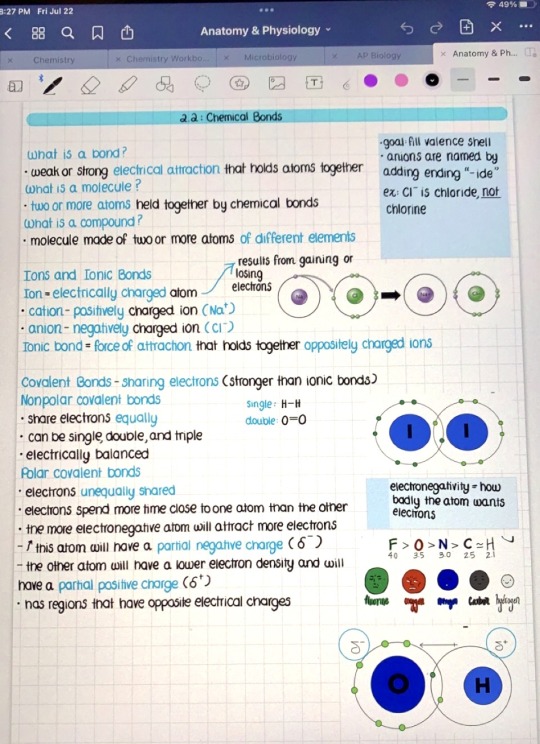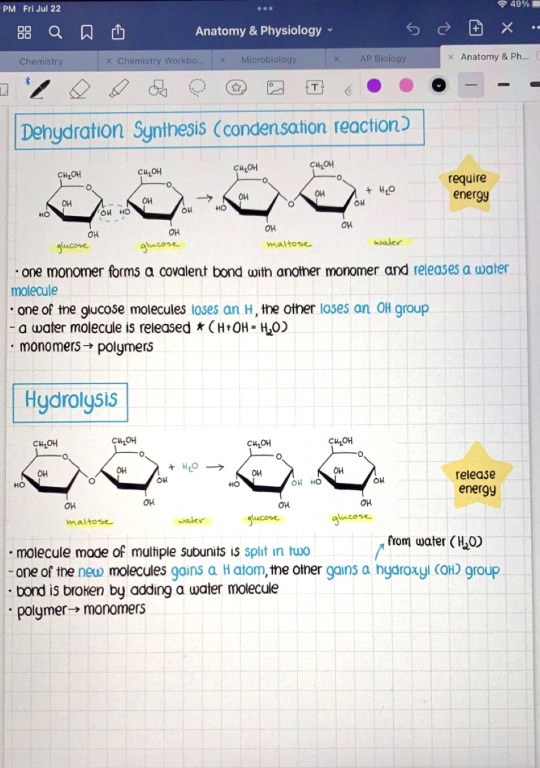Text
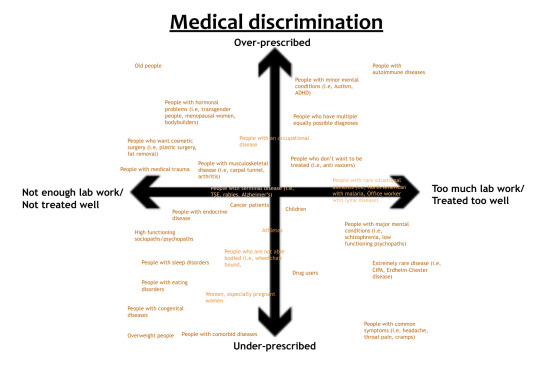
I made this compass to describe discrimination received from medical people to their patients. Note how the further the condition is in one direction, the more problematic I think it is. Also, this is my opinion and I take constructive criticism <3
4 notes
·
View notes
Text

I’m looking at cells from a fish
Trying to find which one is a metaphase and anaphase :/ 🥼
🔬
4 notes
·
View notes
Text


I’ve had to take some breaks in the process, but we’re almost there. ☕️🧬📓
314 notes
·
View notes
Text
Anatomical Directions Vocabulary
Anterior – toward the front of the body
Deep – closer to the center of the body
Distal – farther from the point of attachment or point of reference; away from the midline
Lateral – toward the side of the body
Posterior – toward the back of the body
Superficial – closer to the surface of the body
Midline – line that divides the body into equal right and left sides
Medial – toward the midline
Proximal – close to the point of origin
Bilateral – found on both sides
Unilateral – found on only one side
Dividing Line – pelvic girdle or mid-axillary line
Superior – above
Inferior – below
125 notes
·
View notes
Text


I’ve had to take some breaks in the process, but we’re almost there. ☕️🧬📓
314 notes
·
View notes
Text
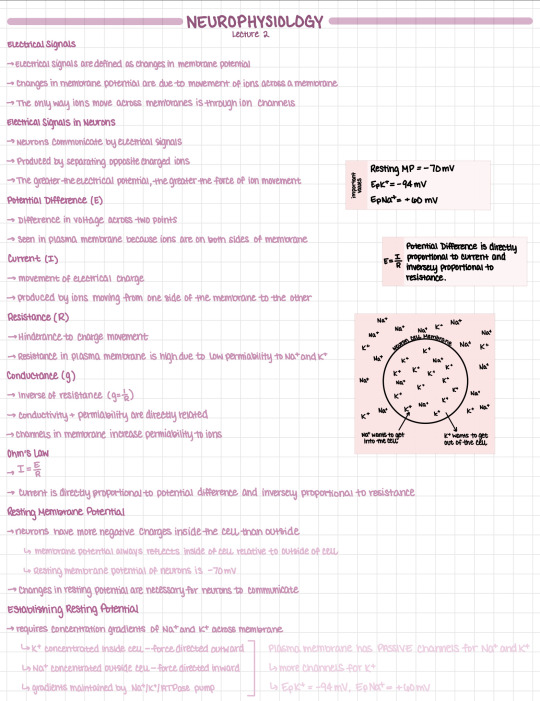
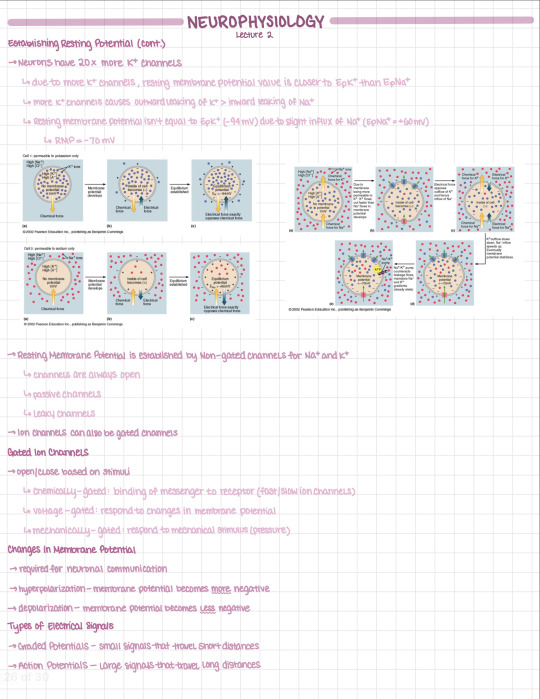

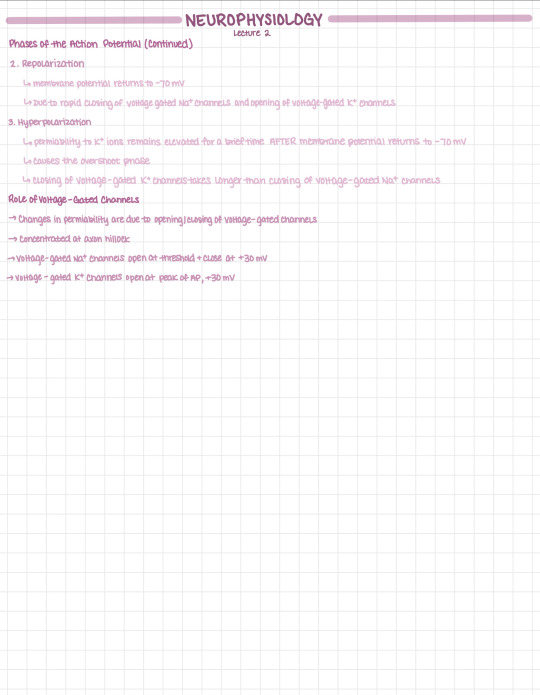
human physiology notes!
my professor specializes in neurophysiology so she goes hard when we get to the neuro unit. these are some notes i’ve taken during my study time on electrical signals in neurons!
(diagrams on second page are not mine, they are from Pearson)
58 notes
·
View notes
Text

''Di͡e͡tskai͡a͡ ėnt͡s͡iklopedīi͡a͡'', 1913 Source
107 notes
·
View notes
Text

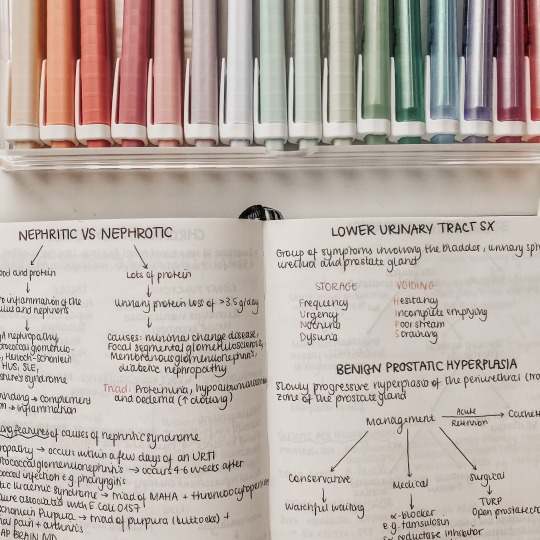


21.09.2023 // currently at a conference in Prague to present some of my research, but still need to do some studying while I'm here so that I don't fall too far behind.
1K notes
·
View notes
Text
On PreMed
Hey.
If you found this blog post, there’s a likely chance that you’re a pre-med kid dragging yourself through your biology undergrad courses, or you’re possibly considering the pathway to becoming a doctor. Honestly, I am too, which is why I’m writing up this whole med-school-based storm. It’s totally jarring to think about the big-picture/long journey to get a medical degree–not to mention the competition among the best of the best–but if you can take it step by step and chunk up your larger aspirations into smaller, timely achievements, you’re already taking initiative to getting where you want to be! At the very least, you’ll understand much better how you’ll like the field of medicine and if becoming a physician is a good fit for you. This whole blog post might be some sort of “copium” for me to think I’m doing better than I am on the pathway to med school, but that will only mean that I have something to look back on to give me courage to keep on keeping on. Hopefully it does for you too! Here’s a deep-dive into what some scholars say about the pre-med community and the pathway to become a physician (all articles will be properly cited if you’re interested in them).
It’s Not All About Being A Good Applicant?
To start off the scholarly pleasantries, there’s an article by Gail Horowitz who is a professor of chemistry to pre-med students and talks about grades not being the only thing to consider to be a good applicant for med school. Horowitz (2010) defines three different types of goals that are important to consider when going through your undergrad career. “...three distinct types of goals: ability goals (wishing to validate one's ability), social comparison goals (wishing to outperform others), and extrinsic goals (wishing to do well and obtain a positive outcome” (p. 217). Based on these defined goals, it’s clear that getting good grades can encompass all the concepts, but outside of that there’s more to consider. Medical schools are reporting to accept non-traditional degrees from the undergraduate phase. There’s whispers of having both clinical experience and being affiliated with a research lab under your belt (as an unspoken requirement) before even applying to med school. This is on top of upkeep of a high GPA and studying for the MCAT. Bonus points if you’ve done volunteering and have a life outside of academia. All of this is to tie back that these are achievable goals if we can categorize them appropriately. While the grind of all things combined are most definitely overwhelming, sorting your goals to fulfill yourself as a person before going to med school.
#medschool#premed#medschoolapplicant#physician#doctor#residency#medicine#research#doctorate#gradschool#graduate#school
0 notes
Text
Part 2
Communication is KEY
Another article written by Natalie C. Grecu (2022) talks about the importance of patient-physician communication. The goal of being a doctor isn’t just to be smart and be the medical expert. You’re dealing with literal lives and responsibilities at hand, and part of being an accomplished physician is to bridge pieces of medicine together for the patient and their families, as well as present it to them in a comprehensive, compassionate, yet understandable way to help patients make medically informed decisions. Grecu states,
“...[the] objective was to introduce communication as a complex process involving more than bedside manner skills. This is intended to reverse the trend of students losing ‘patient-centeredness’ through increased exposure to patients during their medical training” (p.256)
After all, it’s a patient’s right to their medical autonomy. The physician is a helper for their medical decisions, but Grecu boldly argues for the focus to be on the idea of patient-centeredness rather than just being a good-ol-pal. This was also defined in this article saying that, “Bedside manner is accomplished when doctors convey humanistic, compassionate, empathetic, and supportive care (Silverman, 2012; Weissmann et al., 2006)” (p. 256). This alone is simply not enough, however, to guide people through medical complexities. Therefore, students who can be trained to, or who can see a larger picture of a person as a whole rather than someone to treat will have leverage on administering comprehensive patient care. This is highly encouraged to be explored in one’s undergrad career, because it will be used in the medical school universe regardless if there’s a patient in front of you or not. Grades alone in university years do not teach one to be craftful at effective communication within healthcare, to round back to Horowitz's article about grades not being the main focus of a pre-med student.
It’s More Than Being A Physician
Harking a little more on the patient care concept, Alex Doering (2015) wrote an article about why compassionate patient care is a necessary skill as a physician. Specifically, Doering wrote about teaching pre-meds through application via palliative care. To summarize, this article included a study of pre-med students volunteering at a palliative care facility. The objectives of this was to help students develop a correlation of medical knowledge and community care via end-of-life treatment; have students realize the impact that volunteering has in the pre-med realm; link the relationships of volunteer opportunities to pre-med undergrad programs. Doering’s takeaways were to support hospice volunteer programs as a part of the pre-med, undergraduate pathway as it teaches humility of providing healthcare, which can turn into a lesson about quality patient care. There’s a lot to unpack in this article and the author doesn’t explain the explicit correlation between volunteering with the pre-med pathway, but we can infer that the services provided during volunteering reap benefits from both the patient’s and the student’s side. The population of people needing palliative or hospice care are in dire need of constant medical attention. These patients present as sickly because they are–it’s a matter of a tired immune system unable to upkeep basic organ functions mixing with disease that require optimal body functions to fight off illness. Young students being exposed to this reality of patients strikes a chord with heartstrings. Volunteering experiences that cater to a vulnerable community builds purpose to continue along the medical path because there’s often an empathic perspective that is gained from interacting with those who heavily depend on you for life-sustaining care. Thanks to these experiences, you learn compassion from adding value to someone’s life.
#medschool#premed#medschoolapplicant#physician#doctor#residency#medicine#research#doctorate#gradschool#graduate#school
0 notes
Text
Part 3
….But You Matter Too.
Everything so far has been about the livelihood of the patient, but it’s important to understand that pre-meds have to struggle to even get into med school. How are you even supposed to compete for a spot in med school? Where do you even get access to extracurricular opportunities? Where do you start? What if you don’t know how to get from point A to point B? To start the journey there, Victoria Street supports the notion that students should confide in academic advisors. Street, herself, is a pre-med advisor who wrote an article talking about how important it is for students to have access to career counseling. This article, outside of this blog, talks more about minority students having access to career counseling. However, the same concepts that she talks about can be applied to all students who may be struggling to navigate any pre-health undergraduate program. She writes, “ Pre-health advisors are in a unique position to play a role in one of the earlier stages in development of future health professionals, placing them in the ideal role to impact the retention of students, particularly minority students” (p. 9). She then continues to support the role for pre-med student advisors in this passage:
“Increasing the level of support and resources at the undergraduate level could be essential as minority pre-medical students are preparing themselves to be competitive applicants for medical school. Capturing students early on in their undergraduate education through advisement, mentoring, and educational resources could allow more time, attention, and education focused on potential challenges they will face on the path to medical school.” (p.10)
This is essential that future physicians do receive the support they need, as it’s in their hands that the health of the world lay on. The pre-med pathway is academically challenging as we know it, and imposter syndrome is an epidemic to all those who take up the challenge. Without adequate support and self care to the future physician, burn out and uncompassionate healthcare will trickle down to patients they are responsible for. In order to help someone take a splint out of their eye, you have to take the beam out of yours.
All-in-all
Pre-med folks, the whole concept of whole-person view, volunteer-based lessons, and patient-physician communication skills is just a starting point to a whole agenda outside of academia. While good grades and an outstanding MCAT score more-or-less contributes to a competitive application into medical school, it’s what lived experiences you have that show you’re a competitive applicant that can both uphold the altruistic call to guide patients through the intricacies of disease, and the academic rigor that you’re thrown in while training to be a doctor. If you have some time to check out the detailed work that was made by the scholars that were featured in this blog post, it would mean the world to me and to them that the work they curated has reached the lives of the pre-med community who looks to these articles to find courage to continue down an arduous path. I’ve cited them in MLA format.
#medschool#premed#medschoolapplicant#physician#doctor#residency#medicine#research#doctorate#gradschool#graduate#school
0 notes








